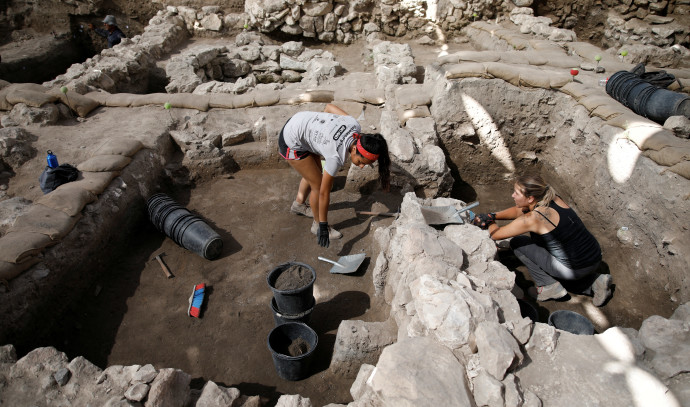Sixties Fan
Roudy
The Canaanites mostly lived in the plains (the coastal strip and near the Jordan).
The Amorites lived in the hill country. Other tribes lived in Canaan: The Perizzites, Hivites, Hittites, Jebusites, Moabites, Edomites, Philistines and Girgashites.
Map of the Canaanites (Bible History Online)
www.bible-history.com/maps/canaanite_nations.html
www.bible-history.com/maps/canaanite_nations.html
All of which have nothing to do with today's Arabs. There is not a single land that Arabs don't currently occupy that wasn't conquered via invasions, looting, pillaging and raping.
Or today's Jews either.
An international team of archaeologists has found and studied 104 enigmatic stone structures called ‘mustatils’ in the southern part of the Nefud Desert in northern Arabia.

www.sci-news.com
Jews have not invaded a single land. It's the Arabs that started doing it when Mohammad appeared on the scene. Today's Jews are in their ancestral, religious homeland. Israel is not going anywhere. Deal with it. Palestinians are invaders and squatters from Egypt, Jordan and other Arab lands.
90% of Palestinians, including Palestinian Bedouin from the Negev, are descended from 1st century Jewish farmers. Deal with it.
Do stop insulting the Bedouins by telling them that they are descended from 1st Century Jewish farmers.
They are Arabs, not Jews ethnically.
The
Bedouin,
Beduin or
Bedu (
/ˈbɛduɪn/;
[11] Arabic: بَدْو,
romanized:
badū, singular بَدَوِي
badawī;
Hebrew: בֶּדוּאִים,
romanized:
bedu'ím, singular בֶּדוּאִי
bedu'í) are
nomadicArab tribes who have historically inhabited the desert regions in the
Levant, the
Arabian Peninsula,
Iraq, and
North Africa.
[12] However, the Arabian Peninsula is the historic and original homeland of the Bedouin Arabs. The English word
bedouin comes from the Arabic
badawī, which means "desert dweller", and is traditionally contrasted with
ḥāḍir, the term for
sedentary people.
[13] Bedouin territory stretches from the vast deserts of North Africa to the rocky sands of the
Middle East.
[14] They are traditionally divided into tribes, or clans (known in Arabic as
ʿašāʾir; عَشَائِر), and historically share a common culture of herding camels and goats.
[14] The vast majority of Bedouins adhere to
Sunni Islam, although there are some fewer numbers of
Christian Bedouins present in the
Fertile Crescent.
[15][7][8][9]
Early history[edit]
Historically, the Bedouin engaged in nomadic herding, agriculture and sometimes fishing in the Syrian
steppe since 6000 BCE. By about 850 BCE, a complex network of settlements and camps was established.
[22] A major source of income for these people was the taxation of caravans, and tributes collected from non-Bedouin settlements. They also earned income by transporting goods and people in caravans pulled by domesticated camels across the desert.
[25] Scarcity of water and of permanent pastoral land required them to move constantly.
The Moroccan traveller
Ibn Battuta reported that in 1326 on the route to
Gaza, the Egyptian authorities had a customs post at
Qatya on the north coast of
Sinai. Here Bedouin were being used to guard the road and track down those trying to cross the border without permission.
[26]

en.wikipedia.org

www.sci-news.com


